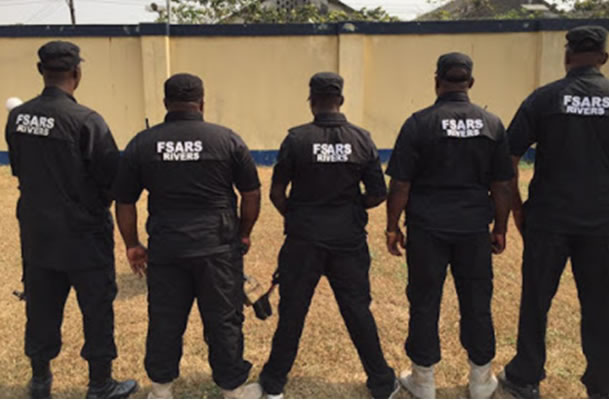As has become habitual over the last few years, Nigerians, yet again, raised their voices in protest over police brutality of the SARS variety following another killing of an innocent youth in Lagos.
Every few months, there is an incident of members of the Special Anti-Robbery Squad (SARS) of the Nigerian police tormenting Nigerians going about their legitimate business, searching peoples’ phones and computers, torturing others and shooting those they did not like the looks of.
It was no surprise that #EndSARS was trending last week in Nigeria’s Twittersphere.
Predictably, the police command has issued another, most likely ineffective, ‘ban on SARS.’ But only yesterday, as I was driving home, I had to pass by a checkpoint mounted by SARS officers during which they flashed a torch in my face and in my car before waving me on. This was around 9 pm.
The logic of these stop and search operations, where there is no emergency or reported crime, has always been baffling. Especially since there is hardly any search but lots of soliciting for bribes through entreaties or threats. But it seemed this is the preferred way of policing in Nigeria. There must be something in the build-up of traffic that the checkpoints generate that soothes the egos of these police officers. It is also symptomatic of the pig-headed resentment the police has to adopt newer, more people-friendly, more efficient ways of policing.
That is why the IGP’s “ban” on SARS is most likely to be treated for what it is—a charade. After all, on August 14, 2018, acting president Yemi Osinbajo ordered the then Inspector General of Police Ibrahim Idris to reform the squad after protests over extra-judicial killings, torture and extortion.
IGP Idris went to his great drawing board, looked it up and down, brainstormed for some considerable time and returned with a transformational idea to end the perennial #EndSARS campaign. He renamed the squad the Federal Anti-robbery Squad (FSARS) and announced that a new head of the unit would be appointed and somewhere in the great offices of the unit, a desk would be set up for human rights complaints.
No one talked about the real reform in training and personal capacitation that is required to turn SARS, and the police force in general, from whatever it is they are to actually be friends of the people. It is not hard to imagine that this latest ban will go the way of the last.
For this transformation to happen (I deliberately chose not to use the word miracle, which is what I think it would require,) the police need to be deliberate about changing how it operates and stop waiting for crimes or felonies to happen, and be more proactive in investigating crimes and preventing them.
Our approach to policing reminds me of the boji-boji game we played as children where one person closes his eyes, turns to the wall and sings boji-boji-o, while the others go to hide so he or she may search and find them. However, while in hiding and it is clear the seeker is about to find you, one always tries to spring out terrify the seeker, alerting the others and generally creating needless pandemonium.
That is what policing in Nigeria reminds me of, a hide-and-seek with uniformed men. Boji-boji policing, except the stakes are higher. Depending on the flip of the coin, you could be playing for your life.
However, this is not exclusive to the police.
We really must stop approaching crime-fighting as if it is a “punitive expeditions” of the colonial era. For instance, when Boko Haram bombed the popular Nyanya Park in Abuja, killing dozens of people, our security response was to install a military checkpoint meters from the scene at Kugbo on the way leading from Nyanya into Abuja city centre. This closed down three out of the four lanes of the express and considering the traffic that plies that road, what followed was boji-boji scale chaos magnified by a thousand.
The logic for that decision was incredible. As if the people of Nyanya were testing a bomb they wanted to use to bomb the city centre on their park, as if every person coming from that axis to the city centre was a suspect. The consequence was endless traffic jams caused by this checkpoint, hundreds of man-hour lost, hundreds of cars damaged from the heat. The irony, however, as investigations would later reveal, was that the bombers of Nyanya, in fact, came from Abuja. They were later arrested in Utako village. That, however, did not make the security forces change their approach and for years, the people coming to Abuja from the Nyanya axis, those people who were bombed, were made to suffer on the road for a crime that was done on them.
During the early days of the COVID-19 lockdown in Nigeria for instance, more people were killed by police and soldiers enforcing lockdown than COVID-19 had in the first few weeks of the pandemic. Videos of people being flogged or made to swim in dangerously contagious sewages by security personnel for flaunting lockdown restrictions made for truly disturbing viewing.
How we police and secure our community is cause for a massive head scratch. Like someone playing boji-boji, a law enforcement officer would rather hide in the shadows waiting for one to put lives at risk so he could “arrest you,” demand bribe for your freedom before letting you walk away than intervene, prevent the offence, prevent putting lives at risk and getting everyone on their way safely and with a smile.
Look at the way Road Safety officials sit in their cars waiting for someone to beat the red light before springing into action to arrest him and demand psychiatric evaluation. Rather than put in place deterrents to prevent this from happening, they would rather take the risk of the driver driving against traffic or against the red light, risking the lives of others so they could milk his pockets for their gains.
Even ‘task force members’ use the same methods. Last week, for instance, as Dantani Ndamadu was driving to his office in Utako, he stopped to buy a wristwatch from a street vendor and parked his car just behind a Toyota Camry in a designated waiting space in front of a hotel to conclude the transaction.
Next thing he knew, some muscle men had jumped out of the Camry into his car, brandishing some ID card, claiming they were members of an FCT task force on something or the other. He could not be sure. They said he had parked on a “sharp corner” and demanded he followed them to their office.
He asked them if there was any sign there that prohibited parking. Or why their own car, by all indications, a private vehicle, was parked in the same place? Those questions offended them greatly.
It took the threat of calling lawyers and the intervention of a police officer and some security guards stationed close by to bring that situation under control, with the task force team driving off empty-handed. Dubious boji-boji fail.
Proclamations banning SARS or FSARS are just that—words. What we need is a holistic reform of policing, and that includes every law enforcement agency to be more about deterrence through reasonable and polite engagement with Nigerians, who after all are not wild things, and the respect of basic human rights.
That is not too much to ask for, is it?

 Join Daily Trust WhatsApp Community For Quick Access To News and Happenings Around You.
Join Daily Trust WhatsApp Community For Quick Access To News and Happenings Around You.


